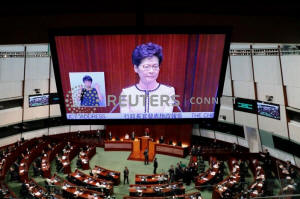Hong Kong leader forced to abandon address, offers no olive branch
 Send a link to a friend
Send a link to a friend
 [October 16, 2019]
By Clare Jim and Twinnie Siu [October 16, 2019]
By Clare Jim and Twinnie Siu
HONG KONG (Reuters) - Hong Kong leader
Carrie Lam had to abandon her policy speech in the legislature on
Wednesday because of jeering lawmakers but later offered no direct olive
branch to protesters, hoping instead to ease resentment by building
public housing.
Lam, who had to broadcast the annual address via a video link after the
rowdy scenes in the city's assembly, hoped to restore confidence in her
administration and address discontent after four months of often violent
anti-government protests.
She had to halt her initial attempts to deliver the address after
pro-democracy lawmakers called out for "five demands, not one less" and
projected the protest rallying cry onto a backdrop behind her.
The protesters' demands include universal suffrage and an independent
inquiry into what they say has been excessive force by police in dealing
with demonstrations.
In her policy statement, Lam was unapologetic about her government's
response to the protests, which has seen her introduce colonial-era
emergency laws and riot police fire thousands of rounds of tear gas and
hundreds of rubber bullets at brick and petrol-bomb throwing activists.

"Any acts that advocate Hong Kong’s independence and threaten the
country’s sovereignty, security and development interests will not be
tolerated," she said.
"Despite the stormy times and overwhelming difficulties Hong Kong is
experiencing, I believe that so long as we accurately adhere to the
principle of 'one country, two systems', we will be able to get out of
the impasse."
The protesters are angry at what they see as Beijing's tightening grip
on the city which was guaranteed 50 years of freedoms under the "one
country, two systems" formula under which it returned to China in 1997.
Beijing rejects the charge and accuses Western countries, especially the
United States and Britain, of stirring up trouble. The unrest poses the
biggest popular challenge to Chinese President Xi Jinping since he came
to power in 2012. He warned that any attempt to divide China would be
crushed.
Lam later told a news conference that she had held "closed door"
meetings with some members of the protest movement and when the unrest
ended she would hold more to address the political situation.
But pro-democracy lawmaker Tanya Chan said Lam should resign for failing
to address the protesters' five core demands.
"Both her hands are soaked with blood. We hope Carrie Lam withdraws and
quits,” an emotional Chan said at a news conference.
Lam has rejected calls to step down.
In her news conference, the Beijing-backed Lam rejected two of the
protesters' five demands - amnesty for those charged and universal
suffrage - saying the first was illegal and the second beyond the chief
executive's power.
HOUSING CRISIS
Hong Kong's boasts some of the world's most expensive real estate and
the inability of many young people to get a place of their own has
fueled the protests.
Lam said her government would drastically increase housing projects and
accelerate the sale of public housing schemes.
[to top of second column]
|

Hong Kong Chief Executive Carrie Lam is seen on a screen as she
reacts to protests by pro-democracy lawmakers, at the Legislative
Council in Hong Kong, China, October 16, 2019. REUTERS/Tyrone Siu

The measures Lam announced are among the boldest in recent years to
take back large tracts of land held by a handful of powerful
developers.
"We are determined to create home ownership opportunities for people
of different income groups such that they will happily make Hong
Kong their home," Lam said.
"I hereby set a clear objective that every Hong Kong citizen and his
family will no longer have to be troubled by or pre-occupied with
the housing problem, and that they will be able to have their own
home in Hong Kong."
Lam said about 700 hectares of private land in the city's New
Territories would be brought back into public use under what is
known as a land resumption ordinance.
More than half of the allocated land would be taken back in the next
few years, she said, adding that a further 450 hectares had been
earmarked for "resumption".
Major developers, including Henderson Land <0012.HK>, New World
Development <0017.HK> and Sun Hung Kai Properties <0016.HK>, are
sitting on “no less than 1,000 hectares” of agricultural land,
according to government estimates.
Lam urged all developers to support the land ordinance.
The Hong Kong stock exchange's property sub-index rose more than 2%
after the measures were announced.
Before Hong Kong returned from British to Chinese rule in 1997, the
colonial administration often deployed the ordinance to take
property for public use, offering compensation to landowners. But no
leader has been able to successfully take back land from private
developers since the handover.
'SINISTER INTENTIONS'
The U.S. House of Representatives on Tuesday passed three pieces of
legislation related to the Hong Kong protests, drawing a swift
rebuke from Beijing, which accused the lawmakers of "sinister
intentions" of undermining stability in Hong Kong.
One of the measures, the Hong Kong Human Rights and Democracy Act,
would require the U.S. secretary of state to certify every year that
Hong Kong retained its autonomy in order to keep receiving the
special treatment that has allowed it to be a major financial
center.
A Norwegian lawmaker, Guri Melby, tweeted that she had nominated the
Hong Kong people for the 2020 Nobel Peace Prize for their stand for
freedom of speech and democracy.

Authorities have arrested more than 2,300 people since June when the
unrest escalated, scores of them teenagers, some as young as 12 and
the oldest 83. Two people have been shot and wounded and thousands
injured.
(Reporting By Donny Kwok, Clare Jim, Sarah Wu, Twinnie Siu, James
Pomfret and Jessie Pang; Writing by Anne Marie Roantree, Farah
Master and Michael Perry; Editing by Robert Birsel)
[© 2019 Thomson Reuters. All rights
reserved.]
Copyright 2019 Reuters. All rights reserved. This material may not be published,
broadcast, rewritten or redistributed.
Thompson Reuters is solely responsible for this content. |